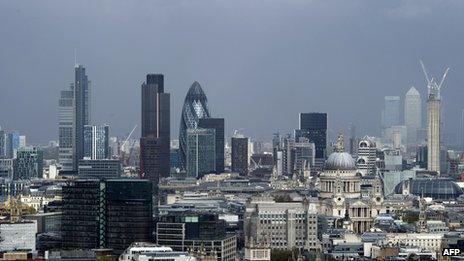Why is the Treasury defending big bankers' bonuses?
- Published
- comments

One important cause of the great 2007-08 banking crisis was that bankers had been given incentives, in the form of enormous cash bonuses, to take dangerous risks to boost their firms' profits.
Which is why some will be shocked and even horrified that the Treasury has decided to challenge at the European Court new European Union rules that would limit bonuses for bankers to the equivalent of one year's salary - or two years' with shareholder approval.
But the Treasury insists that it is not defending the kind of rewards that did so much financial and economic harm.
It argues that the EU bonus ceiling would have the opposite effect to that intended, in that the cap is encouraging banks based in London to massively increase the fixed salaries of their top staff, to prevent these executives quitting the EU for financial centres where such pay controls don't exist.
There is evidence this inflation of bankers' salaries is already happening.
And when bankers can earn colossal sums come rain or shine, there is very little incentive for them to behave prudently and responsibly - as the chancellor has argued.
Also, most bonuses these days are paid in shares and cannot be pocketed for years after they have been awarded - so today's bonus system contains a disincentive to take the kind of risks that would blow up the banks.
There is of course another point, which the chancellor doesn't shout about. Which is that the vast majority of Europe's big bonus paying banks are based in London, rather than Paris, Frankfurt or Milan - and there was a risk that London's leadership as a global financial centre would be jeopardised by the enforced pay restraint.
In defending the interests of the City, the chancellor finds himself defending the very large rewards of bankers.
That he may not find wholly comfortable.
So for neutral observers of the latest scrap between Labour and the Tories, the timing of the announcement of the Treasury's bonus cap appeal is delicious.
Here is why.
The Tories have spent the past 24 hours pointing out the extent to which the Labour leader Ed Miliband has alienated leaders of big business, with his plans to reverse a cut in the corporation tax rate, to strip housebuilders of unused development and to prevent energy companies from increasing power prices.
Quite a number of bosses of big companies, even Labour-sympathising ones, tell me that they were made to feel profoundly uncomfortable by Mr Miliband's speech to his conference, because they felt he was characterising them as the enemy - in a return to the politics of industrial confrontation which they believed Tony Blair had ditched forever.
This froideur between the bosses and Labour's front bench has been delighting senior Tories.
But if history teaches that it is dangerous for Labour to make an enemy of big capital, it may not be astute popular politics for the Conservatives to be seen as the chum of financial capital, otherwise known as the bankers.
The effectiveness of the Tories' attack on Labour as the enemy of wealth creation may be blunted if they are seen as too close to a face of capitalism seen by many as unacceptable.